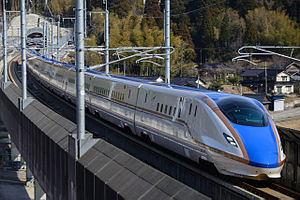Tsurugi (train)

A JR West W7 series train on the Hokuriku Shinkansen
|
|
| Overview | |
|---|---|
| Service type | Shinkansen |
| Status | Operational |
| Locale | Hokuriku region, Japan |
| First service | 1 October 1961 (Limited express) 14 March 2015 (Shinkansen) |
| Current operator(s) | JR West |
| Former operator(s) | JNR |
| Route | |
| Start | Toyama |
| Stops | 1 |
| End | Kanazawa |
| Distance travelled | 58.5 km |
| Average journey time | 23 minutes |
| Service frequency | 18 return services daily |
| Line used | Hokuriku Shinkansen |
| On-board services | |
| Class(es) | Green + Ordinary |
| Technical | |
| E7 series, W7 series | |
| Track gauge | 1,435 mm (4 ft 8 1⁄2 in) |
| Electrification | 25 kV AC, 50/60 Hz overhead |
| Operating speed | 260 km/h (160 mph) |
The Tsurugi (つるぎ?) is a high-speed shinkansen train service operated by West Japan Railway Company (JR West) between Toyama and Kanazawa on the Hokuriku Shinkansen line in Japan. The shinkansen service was introduced on 14 March 2015, but the name was first used for a limited express overnight "Blue Train" sleeping car train service operated by Japanese National Railways (JNR) and later by JR West from 1961 until 1994. It was named after Mount Tsurugi.
As of 15 March 2015[update], 18 return Tsurugi services operate daily as a shuttle between Toyama and Kanazawa, calling at Shin-Takaoka en route, typically taking 23 minutes. Trains operate at a maximum speed of 260 km/h (160 mph).
Tsurugi services are operated using JR East E7 series and JR West W7 series 12-car train sets based at Nagano and Hakusan depots respectively.
A JR East E7 series train on the Hokuriku Shinkansen
Tsurugi shinkansen services use 12-car JR East E7 series and JR West W7 series trainsets, formed as follows, with car 1 at the Toyama (eastern) end. Cars 1 to 7 are ordinary-class cars with 2+3 seating, car 11 is a "Green" car with 2+2 seating, and cars 8 to 10 and 12 are not available for passenger use. All cars are no-smoking.
...
Wikipedia
